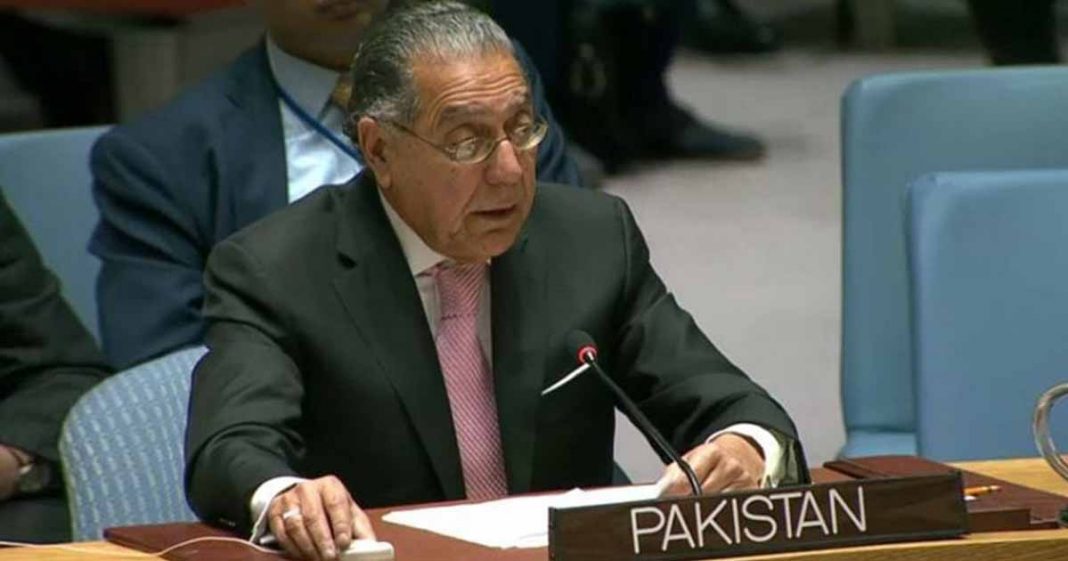Pakistan has reaffirmed its opposition to adding new permanent members on the UN Security Council, stressing that any increase in permanent seats will compound the 15-member body’s paralysis, and prevent the majority of small and medium-sized states from serving on it.
“The expansion of the Security Council should promote ‘equitable representation’ not create new historic injustice, ”Ambassador Munir Akram told delegates at the deadlocked Inter-Governmental Negotiations (IGN) aimed at reforming the Council on Thursday,
The Pakistani envoy was participating in a discussion on a proposal — called “L69 Model” — from a group of Asian, African, Latin American, the Caribbean, and Pacific Island states aimed at restructuring the Council.
The group argues for an expansion of the Council, in both permanent (6 additional seats, bringing the total to 11) and non-permanent (5 additional seats, bringing the total to 15) categories of membership, with equitable geographical representation. The group introduced a document, L69, in 2007–2008 that served as the impetus for the IGN process.
“Our fundamental problem with the L.69 model is the proposed expansion of permanent seats,” Ambassador Akram said, underlining that permanent membership is the reason for the bouts of paralysis is in the Security Council.
Read More: Rakhi Sawant Pledges Support for PTI and Imran Khan
“The problem cannot be the solution,” the Pakistani envoy added.
Full-scale negotiations to reform the Security Council began in the General Assembly in February 2009 on five key areas — the categories of membership, the question of veto, regional representation, size of an enlarged Security Council, and working methods of the council and its relationship with the General Assembly.
Despite a general agreement on enlarging the Council, as part of the UN reform process, member states remain divided over the details, as diplomats representing various groups push for their respective proposals.
India, Brazil, Germany and Japan — known as the Group of Four — are campaigning for permanent seats as they seek expansion of the Council by 10 seats, with six additional permanent and four non-permanent members.
On the other hand, the Italy/Pakistan-led Uniting for Consensus (UfC) group has proposed a new category of members — not permanent members — with longer duration in terms and a possibility to get re-elected.
On the other hand, the Italy/Pakistan-led Uniting for Consensus (UfC) group, which firmly opposes additional permanent members, has proposed a new category of members — not permanent members — with longer duration in terms and a possibility to get re-elected.
The Security Council is currently composed of five permanent members — Britain, China, France, Russia and the United States — and 10 non-permanent members elected to serve for two years.
In opposing “L69 Model” which, among other elements, seeks more permanent members on the Council, Ambassador Akram suggested that any country seeking a more frequent presence on the UNSC should do so through democratic process of periodic election by the General Assembly.
“The model would create more permanent seats (accommodating 6 States) but create only 5 non-permanent seats to be available to the 182 remaining countries not included among the 11 old and new ‘permanent’ members,” he noted.
Read More: US and Arab Nations Crafting Detailed Plan for Palestinian State Establishment: Reports
Noting that one of the elements in the L69 model seeks removal of items from the UNSC’s after a certain period of time, Ambassador Akram said that this could reward those states which manage to block formal discussions of those items.
“What needs to review is whether the dispute/conflict has been resolved or not,” he said, adding, “If this have, the Security Council can decide to remove the item. “But, if not, the Security Council should not adopt a resolution or whenever the Council resolution exist, act under Article 25, to secure their implementation.”
In conclusion, Ambassador Akram highlighted UfC’ proposal, saying it provides the most pragmatic way to make the Security Council more representative of, and accountable, to the general membership of the United Nations.














